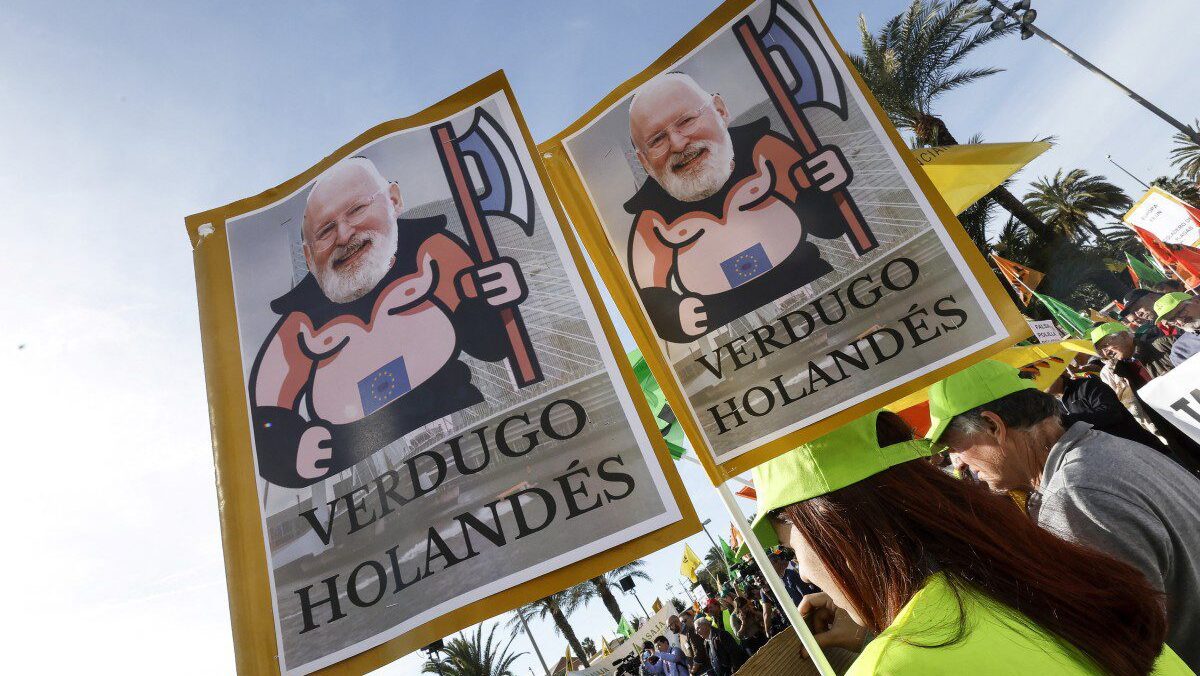
Photo: JOSE JORDAN / AFP
Following a large demonstration blocking the port in Valencia on Thursday, Spanish farmers are revving up their tractor engines and heading to the capital, El Debate reports. This follows government failure to meet any of their demands, following a meeting between Spain’s Ministry of Agriculture, Fisheries, and Food (MAPA) and its major farming associations.
Following weeks of nationwide protests, farmers sat down last week for talks with agricultural minister Luis Planas. But on Monday, the farmers, under the umbrella organization Union of Farmers and Ranchers Unions (Unión de Uniones de Agricultores y Ganaderos), rejected his proposals as insufficient to address their concerns.
On Sunday, a predicted minimum of 500 tractors and 100 buses of farmers and their supporters will march through the capital to the MAPA headquarters. This follows Monday’s rally in Algeciras, Cádiz, which condemned the importing of Moroccan fruit and vegetables, alongside wider regulatory threats to Spain’s rural way of life.
The forthcoming demonstration—which has received authorization from the government—will enter the city on Sunday morning from five different directions, with columns of tractors moving slowly along the main roads. Demonstrators on foot will join the heavy machinery further into the city and by 2 p.m., the entire march will meet in front of the ministry.
Planas appeared to concede to farmers with a list of eighteen measures aimed at ameliorating the effects of low prices, competition from outside the EU, high energy costs, and the laborious administrative processes and inflexible regulations needed to receive subsidies from the EU’s Common Agricultural Policy (CAP).
Luis Cortés, spokesperson for the farmers, called the proposals a “deception” because “none of those measures will fix any of the problems.”
Planas’ proposed measures included creating a State Agency for Food Information and Control that would enforce laws already in place, ensuring farmers are paid prices for their products above the costs of production. It would make the CAP’s “digital notebook” requirement voluntary (backed by compliance incentives).
Additional proposals include the elimination of some organic farming surface areas and crop rotation requirements, submitting a proposal to the EU by February 26th for a simplification of administrative requirements within the CAP national plan, €284.5 million in 2024 for insurance programs, publication of sanctions for violating the supply chain law, and more effective border controls of products entering the EU.
Cortés accepts that the Food Information and Control Agency (AICA) already exists and routinely completes inspections to ensure the food chain law is followed. However, since 2021 “not a single penalty due to non-compliance with the minimum price” has been issued. Farmers are demanding the law be amended to allow for better definitions and calculations of production costs because the law—as it stands now—has not been able to protect farmers from being underpaid for their goods—often at ruinous prices.
Cortés also emphasized that growers are “tired” of complying with measures dictated by the government that “do not benefit farmers, consumers and the environment.” He cites as an example that areas with vastly different climates—such as Asturias and Andalusia—have to follow the same rules for cover crops, crops planted in between the principal crops to keep soil covered.
Farmers are also demanding more inspections in ports to root out imports that do not comply with EU rules and trade agreements, for example by containing pesticides or fertilizers prohibited in the EU.
Rather than a string of measures, Cortés asks the government for an omnibus bill in the legislature that would meet farmers’ demands and modify the CAP national plan since the European objectives “can be met with less absurd measures,” than CAP currently requires.
Spanish farmers have been particularly angry with the increasingly technocratic requirements they are subjected to in order to comply with the CAP: Farmers must now keep records online, including through the “digital notebook” requirement, and submit geo-reference photographs. These require either geo-surveying expertise or photography equipment with GPS.
Farmers want the elimination of hi-tech requirements and a simplified regime for small farmers, as existed in previous CAP plans. They also want an expansion of eco-schemes to address the needs of particularly arid areas.
The EU’s agricultural ministers meet again on February 26th, no doubt watched closely by angry farmers.Meanwhile expect angry tractor protests in Spanish cities demanding change.
